In search of relative time
This proposal was created for LACMA Art + Technology Lab commission by Taeyoon Choi and E Roon Kang. This text and image was created in January of 2014 in New York City through collaborative brainstorming sessions. The document is formatted and edited to fit LACMA Art + Technology Lab’s application. This proposal is published online in hope to further develop our idea and find supporters.
Full description of the proposed project
This project is a proposition to live in an unreal time in real-time world.
We will construct new measurement and device for personalized time. Inspired by the mechanics of slide rule, we will build interface and applications which allows users to set their own current time, days of the year and also how fast the time is passing. Everyone will have their own time.
Second phase is to build an interactive network for individuals to share their personalized time. Long distance lovers in Los Angeles and Seoul can be awake in the same time. The time of their communion is neither in standard time, but it is the time they share. Their device will indicate same time and speed over great distance, their presence is achieved in synchronized time.

Fig. 1. An example of circular slide rule and a clock showing absolute time
Finally, we will construct a third kind of time, Consensus Time of a gallery in LACMA that will be dedicated for the project. Museum visitors and online participants, who have already set their own time, can become play the Time Game. They trade in their time to decide LACMA’s time. Playful game mechanics will be applied as the committee of time players decided what time it is. True democracy of time is achieved. The game play consequently affects duration and time of scheduled events in the gallery. For example, the gallery may have to open 4 AM if everyone decides it is 11AM Consensus Time is actually 4AM Pacific Time.
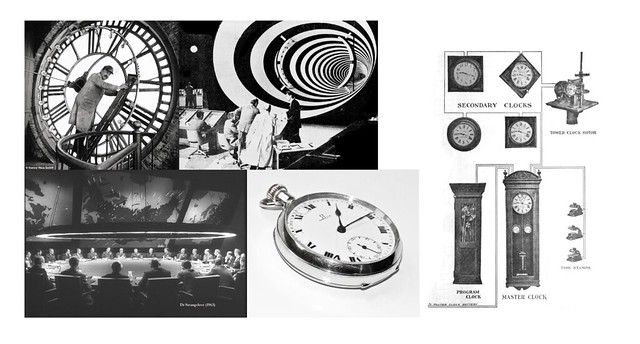
Fig. 2. Collection of images of Public Clock, Time Travel, Consensus and Master- Slave clock system
Please describe the artistic or creative merit of the proposed project
Since definition of Absolute Time by Isaac Newton, most of societies throughout history depended on the mathematical concept of time as a factor independent from external events. Thus, Time has the ultimate supremacy over objects and space as the backdrop for everything that happens. We propose to investigate the relative concept of personalized time. Through a series of artistic research in collaboration with scientists and economists, we will define new concept of time that will be more relevant to the current society and needs of individuals.
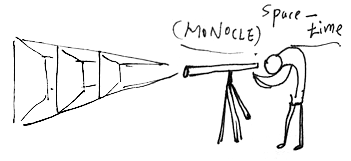
Fig.3. Seeing through multiple present
Through extensive research, prototyping and consultation, we will collaborate with technologists, sociologists, economists and the museum public to build a conceptual and technical framework to challenge the Greenwich Mean Time, geopolitical divide of 24 time zones. Personalized time will enable instant disconnect from the standard time zone. This means you will have an ability to become transparent from data collection agency, ability to exist in multiple places at once, ability to live in an unreal time.
In the alternate reality we are creating, you can stretch the present by slowing down speed of time. ‘Now’ becomes a malleable space in which you can sculpt memory from past and future. By synthesizing time and space, you can be present elsewhere in another time. Appropriating advanced computational and network technology (from Electronic Trading, Precision Time Control, Global Positioning Systems and so on) the project will enable individuals to remap their sense of time to perception and cognition. This results non-standard time, a flexible sense of space based on shared sentience.
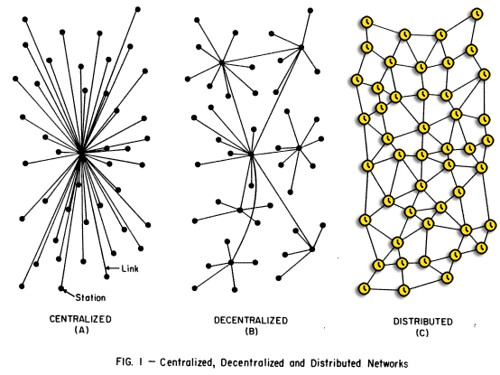
Fig. 4. Distributed Network of Clocks
Why do you consider this project to be a meaningful exploration of emerging technology?
The contemporary world operates on the global synchronization of nano second precision. The financial industry rely on fiber optic communication for instant trade exchange. Massive architectures are built for data storage of private and public information. Capitalism works in time. We intend to create disruption in the synchronize the world by appropriating time signal technology such as PTP (such as NTP and GPS) and atomic clock. Almost all time clock synchronization is built for master and slave system. We envision a rhizomatic system based on direct democracy of all times, where each clock is master and slave.
In what ways does your project inspire dialogue about the issues at hand, including the relationship between technology and culture?
The mode of perception in the 20th century was based on consumption of mass produced contents, News, Radio, Television and Cinema. In the 21st century, it is is shaped by continuous customization of online identities based on real time synchronization. Bernard Stiegler notes integration of consciousness and technology results in “Industrialization of Memory” (Technics and Time 2: Disorientation).
As complex computational systems (cybernetics) merge with tertiary memory (database), a crude form of automation take control of our time. Our presence is preserved as quantified data and patterns.
This project is a guide to resist global synchronization and create autonomy of consciousness. By creating alternative flow of times in distributed network, time becomes a new form of shared resource.
Please describe your proposed plan for public engagement. What opportunities do you foresee to share prototypes, demonstrations and process with the public?
For the duration of one month, we will be in residence at a laboratory inside of a gallery in LACMA. We will build a working prototype of a mobile device and applications, and also present a series of participatory workshops and performances. We are especially interested in engaging with youth and young adult in the project. We have extensive experience of teaching technical and artistic workshops. Taeyoon co-founded School for Poetic Computation, and directs Making Lab at APAP, South Korea
About 10 guest collaborators will be invited to experiment with the device and system we build. The list includes artists David Horvitz, Christine Sun Kim, Chris Woebken, Sascha Pohflepp, Jamie Zigelbaum and more. We are searching for more scientists and philosophers to join in conversation with us through out our residency.
What data will your project produce that may be of interest to other artists, technologists, or arts organizations?
The project will log information of participants involvement with the alternate time. The data set will include the time of the their location at the moment, and the location of the time they wish to live. In deciding Consensus Time, information of currency of time to labor and attention will be archived.
Biography of artists
Taeyoon Choi is an artist, educator and curators based in Brookyn, NY and Seoul, Korea. He is the co-founder of School for Poetic Computation, an alternative school with motto of “More Poems, Less Demos”. His art practice often involve hacking electronics and building circuits, drawing and storytelling, as well as intervention in the public space. Taeyoon often collaborates with media artists, performing artists and activists to realize socially engaged projects and immersive experience. Recently he has been curating exhibitions and education programs for public art festivals such as Anyang Public Art Festival in South Korea, where he directs Making Lab, a community hackerspace run by artists. He lectured at Parsons School of Design and served as a facilitator for The Public School New York. Taeyoon was a resident and fellow at Eyebeam between 2008 and 2011.
E Roon Kang lives and works in New York, where he operates an interdisciplinary design studio, Math Practice, with interest in studying, evaluating, and criticizing complex systems and its consequential pointlessness of a pursuit of efficiency. E Roon is a TED Fellow (2012), and was previously a research fellow at SENSEable City Laboratory of MIT. His work has been shown at places including the Museum of Modern Art (MoMA), Seattle Public Library, and Architectural League of New York, and had won NSF Science and Engineering Visualization Challenge in 2010. E Roon is currently an adjunct professor at New York University, ITP, taught courses at SUNY Purchase, Rutgers University and Bauhaus-Universität Weimar, and holds an MFA in graphic design from Yale.
Budget and schedule
Budget and schedule
We are omitting detailed budget and schedule because the detail does not hold useful information yet
Sketches

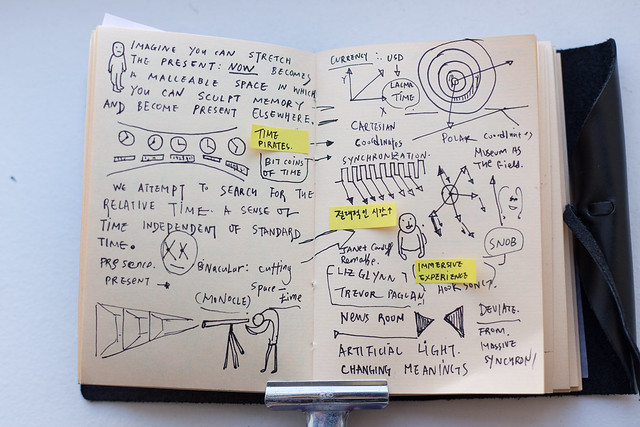
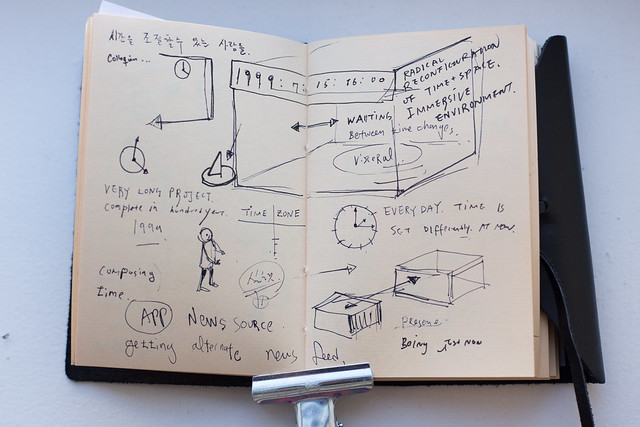 Skethes by Taeyoon Choi.
Skethes by Taeyoon Choi.